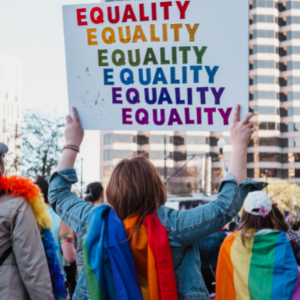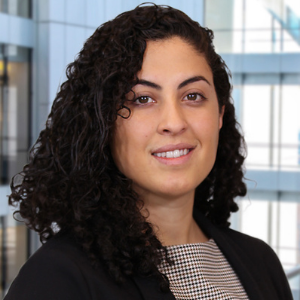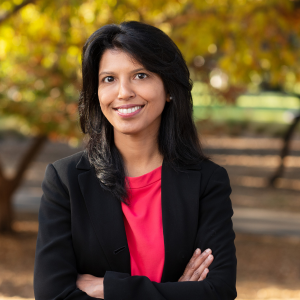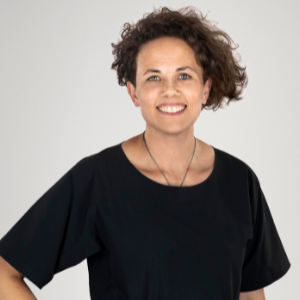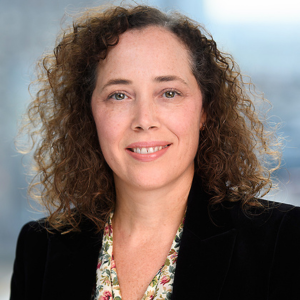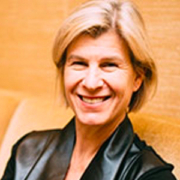Mary Cassai: Senior Vice President, Perioperative Services, NewYork-Presbyterian Hospital
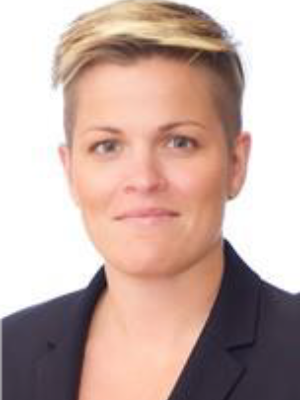 “When you’re building teams, you always want to be strongly committed to the diversity of your team’s experience and ideas,” says Mary Cassai. “You don’t want to have uniformity in thought or expertise, as it could challenge disruption and innovation.”
“When you’re building teams, you always want to be strongly committed to the diversity of your team’s experience and ideas,” says Mary Cassai. “You don’t want to have uniformity in thought or expertise, as it could challenge disruption and innovation.”
Cassai is responsible for all operational oversight for Perioperative Services at NYP, including 140 operating rooms, 10 central sterile reprocessing departments and 40 endoscopy suites, producing over 180,000 procedures annually.
Converting Empathy Into Purpose
“I love problem solving. I am driven by challenge and uncertainty,” says Cassai. “I find comfort in bridging operational gaps and in understanding the dynamics of people and process that will lead to the best outcome and solution.”
Cassai finds purpose by creating the best possible environment of care for both patients and the interdisciplinary teams. She loves building relationships, partnerships and discovery – as well as finding what inspires people, the why it matters; and how different pieces of the puzzle and people come together to create the greatest results.
While in nursing school, her uncle was diagnosed with end-stage liver disease cancer. Observing the gaps in his bedside care validated why she was going into nursing. From a young age, she has always been driven by empathy and a keen sense of what empathy means; which is invaluable in healthcare: “I sometimes call it my superpower. I feel like I can decipher quickly how folks feel in certain dynamics.”
At the age of eight, she struggled with the diagnosis of obsessive-compulsive disorder (OCD), which she remembers as world changing: “Rather than suffer through it, I made it work in my benefit in terms of my own perseverance and seeing how I could optimize some of that compulsive tendency into good and being the most productive and healthy.”
She accredits her parents with not ignoring the condition or hiding it away, but rather handling it directly with consideration and thoughtfulness: “I think that experience, which both pained me and also allowed me to become much stronger and even more empathetic, led me towards this desire of being in healthcare.”
Orchestrating Teams to Harmonize
In her present corporate remit, much of Cassai’s work is in leading multiple teams across the enterprise to improve clinical and operational outcomes. She provides the oversight of all strategic planning as it relates to operating room and endoscopy operations across 10 campuses.
Empathy comes into play differently than it did back in her bedside days: “It’s the ability to understand quickly what each person’s strengths are and how to leverage that best across teams in order to achieve success.”
She has found that when you have the right diversity of people and experience in a room, you come to the end-result faster because of positive friction and the ability to leverage each other’s thoughts in a spirited way.
Agility has become even more important as a leadership skill, especially in managing increasing complexity, whether it be facing the “untoward circumstances” of COVID-19 and having to create more hospital bed capacity for the surge of acute patients or transitioning from a clinical operational world into a more technology-based environment.
“Orchestrating” part of the why it matters for Cassai means helping everyone to harmonize together as a group – even beyond words through body language and action. Encouraging fluid, interrelating working dynamics – to drive for the best solutions. The previous years’ Covid 19 required orchestrating unprecedented collaboration: “We had to figure this out together, and that’s what we did. The solidarity of the team was absolutely amazing. It was beautiful in the face of disaster, and I walked away feeling like this is a once-in-a-lifetime experience.”
Fail Fast and Fail Forward
Humility has served Cassai, including being able to transparently acknowledge to her team when something didn’t go as planned. She’s learned the criticality of asking more questions and leading by coaching her teams.
Encouraged throughout her career by mentors who supported her professionally and in growing in emotional maturity, she received the great advice to: “Fail fast, fail forward, move on.”
When failure happens, Cassai focuses on understanding what could have been done differently, to learn from the mistake, but not to harp on it, noting that failing is less about the failing and more about the learning that comes after, which often makes for even better results. She embraces this mental strategy for herself and imparts this on her teams.
“It’s important that we don’t live in monotony and that we are absolutely thought-provoking, disruptive, and creative. If we start to stifle that because of the unknown, then we’re never going to advance as quickly as we need to.” Don’t let perfection be the enemy of progress.
This advice also helped her to step up, professionally, and take on roles she hadn’t foreseen herself in: “Having been given that gift very early on allowed me to be more fearless in my choices and allowed me to rise into what others saw in me with less trepidation.”
Being Part of An Inclusive Organization
As a lesbian woman, Cassai feels blessed to be part of such an inclusive organization as NYP: “It is definitely an honor to work in a place where I feel so much pride not only for the organization, but for how much pride they take in their people. It’s been truly a feeling of belonging and it gets even better and more powerful day-by-day and week-by-week. I can’t say enough about the sense of belonging and safety that this organization provides.”
She recalls how warmly she and her son’s mom were embraced from the start. Senior leadership demonstrated such enthusiasm and joy in meeting and learning about who Mary called family.
Cassai is also proud of the consistently inclusive hiring and promotional practices at NYP: “There’s been a genuine and tremendous amount of focus by the organization on creating diverse platforms of teams.”
Earned Comfort in Her Skin
Early on in her journey as a registered nurse, Cassai recalls she was not as comfortable in her own skin as a lesbian woman as she is today, and had moments when she felt like she wasn’t being who others wanted her to be – not because anyone else said so, but from her own insecurities.
What Cassai did experience were people would question her sexuality aloud and sometimes make discriminating comments. Worn down by the constant questioning of her sexuality, she decided to take a stance and cut her hair short in her mid-20’s, hoping that would make it clear: “I made the decision to own who I am.”
Shortly after, strangers have said some hateful things to her based on appearance, and she remembers thinking she needed to empower herself to turn the pain into pride: “I had to learn to not take it personal, this was their issue, not mine. I acknowledged that this is going to happen. It’s not okay, but it’s going to happen. I was really shaken up but I just focused on what matters and became my own advocate and ally.”
Having experienced moments when I was not supported for who I am and was, Cassai has made it a purpose to be the person who does: “From that moment forward, I said to myself that I would never allow anyone I worked with, or was close to, to be on the receiving end of that.”
As a leader, Cassai wants to make it safe for people to always feel like they can speak up. It’s important for her to promote a feeling of safety, belonging and acknowledgment. She focuses on checking in, asking the right questions to understand how they are feeling: “I make a conscious choice to acknowledge what’s happening in the world and within my teams on a day-to-day basis, even if it’s just to check in.”
Cassai considers her seven-year-old son to be her world, and loves spending time with him going on adventures, watching movies and doing sporting activities. She rides the Peloton twice a day, enjoys reading and cooking – and hopes to build a pizza oven one day.
By Aimee Hansen


